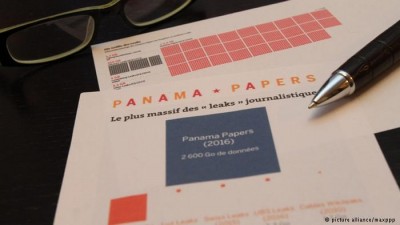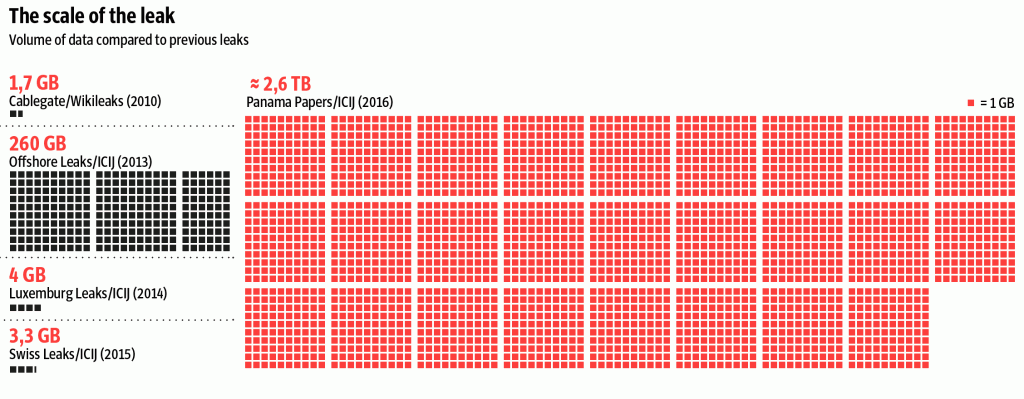Selective Leaks Of The #Panama Papers Create Huge Blackmail Potential. “Smear People the U.S. Dislikes”

A real leak of data from a law firm in Panama would be very interesting. Many rich people and/or politicians hide money in shell companies that such firms in Panama provide. But the current heavily promoted “leak” of such data to several NATO supporting news organization and a US government financed “Non Government Organization” is just a lame attempt to smear some people the U.S. empire dislikes. It also creates a huge blackmail opportunity by NOT publishing certain data in return for this or that desired favor.
Already some 16 month ago Ken Silverstein reported for Vice on a big shady shell company provider, Mossak Fonseca in Panama. (Pierre Omidyar’s Intercept, for which Silverstein was then working, refused to publish the piece.) Yves Smith published several big stories about the Mossak Fonseca money laundering business. Silverstein also repeated the well known fact that Rami Makhlouf, a rich cousin of the Syrian president Assad, had some money hidden in Mossak Fonseca shell companies. He explains:
To conduct business, shell companies like Drex need a registered agent, sometimes an attorney, who files the required incorporation papers and whose office usually serves as the shell’s address. This process creates a layer between the shell and its owner, especially if the dummy company is filed in a secrecy haven where ownership information is guarded behind an impenetrable wall of laws and regulations. In Makhlouf’s case—and, I discovered, in the case of various other crooked businessmen and international gangsters—the organization that helped incorporate his shell company and shield it from international scrutiny was a law firm called Mossack Fonseca, which had served as Drex’s registered agent from July 4, 2000, to late 2011.
A year ago someone provided tons of data from Mossak Fonseca to a German newpaper, the Sueddeutsche Zeitung. The Munich daily is politically on the center right and staunchly pro NATO. It cooperates with the Guardian, the BBC, Le Monde, the International Consortium of Investigative Journalists and some other news organization who are all known supporters of the establishment.
The SudDeutsche Zeitung claims that the “leaked” data is about some 214,000 shell companies and 14,000 Mossak Fonseca clients. There is surely a lot of hidden dirt in there. How many U.S. Senators are involved in such companies? Which European Union politicians? What are the big Wall Street banks and hedge funds hiding in Panama? Oh, sorry. The Sueddeutsche and its partners will not answer those questions. Here is how they “analyzed” the data:
The journalists compiled lists of important politicians, international criminals, and well-known professional athletes, among others. The digital processing made it possible to then search the leak for the names on these lists. The “party donations scandal” list contained 130 names, and the UN sanctions list more than 600. In just a few minutes, the powerful search algorithm compared the lists with the 11.5 million documents.For each name found, a detailed research process was initiated that posed the following questions: what is this person’s role in the network of companies? Where does the money come from? Where is it going? Is this structure legal?
Essentially the SudDeutsche compiled a list of known criminals and people and organizations the U.S. dislikes and cross checked them with the “leaked” database. Selected hits were then further evaluated. The outcome are stories like the annual attempt to smear the Russian president Putin, who is not even mentioned in the Mossak Fonseca data, accusations against various people of the soccer association FIFA, much disliked by the U.S., and a few mentions of other miscreants of minor relevancy.
There is no story about any U.S. person, none at all, nor about any important NATO politician. The highest political “casualty” so far is the irrelevant Prime Minister of Iceland Sigmundur David Gunnlaugsson who, together with his wife, owned one of the shell companies. There is no evidence that the ownership or the money held by that company were illegal.
So where is the beef?
As former UK ambassador Craig Murray writes, the beef (if there is any at all) is in what is hidden by the organizations that manage the “leak”:
The filtering of this Mossack Fonseca information by the corporate media follows a direct western governmental agenda. There is no mention at all of use of Mossack Fonseca by massive western corporations or western billionaires – the main customers. And the Guardian is quick to reassure that “much of the leaked material will remain private.”What do you expect? The leak is being managed by the grandly but laughably named “International Consortium of Investigative Journalists”, which is funded and organised entirely by the USA’s Center for Public Integrity. Their funders include
Ford Foundation
Carnegie Endowment
Rockefeller Family Fund
W K Kellogg Foundation
Open Society Foundation (Soros)
The International Consortium of Investigative Journalists (ICIJ) is part of the Organized Crime and Corruption Reporting Project (OCCRP) which is financed by the U.S. government through USAID.
The “leak” is of data selected by U.S. friendly organization out of a database, likely obtained by U.S. secret services, which can be assumed to include much dirt about “western” persons and organizations.
To only publish very selected data from the “leaked” data has two purposes:
- It smears various “enemies of the empire” even if only by association like the presidents Putin and Assad.
- It lets other important people, those mentioned in the database but not yet published about, know that the U.S. or its “media partner” can, at any time, expose their dirty laundry to the public. It is thereby a perfect blackmailing instrument.
The engineered “leak” of the “Panama Papers” is a limited hangout designed to incriminate a few people and organization the U.S. dislikes. It is also a demonstration of the “torture tools” to the people who did business with Mossak Fonseca but have not (yet) been published about. They are now in the hands of those who control the database. They will have to do as demanded or else …


